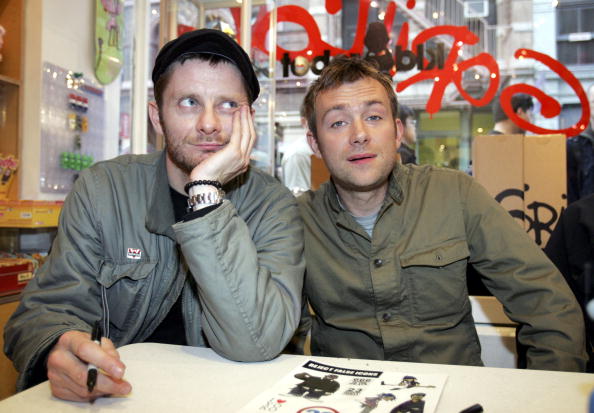It's been a while since we've posted here on Blurballs, but we want to apologize for the hiatus. The following is an interesting little interview taken from Vulture (source below) whom interviewed Damon Albarn about his recent work on November 2017.
Yes, we're back!
In exploring the differences between Damon Albarn’s twin flagship bands, it never occurred to me that Albarn viewed the one as a commentary on British life and the other as an exploration of America through music. It tracks, though. The sound experiments of 2001’s Gorillaz imagined the breakbeats and turntable wizardry of the States’ bubbling independent hip-hop scene growing a natural affinity for pop hooks and melodies, a prescient concept to revisit in a year when the beats on the new Jay-Z album sound more like Roc Marciano than Rocafella Records. The washed-out sonics Danger Mouse brought to Demon Days rolled aspects of American surf and psych rock into modern pop, presaging the ’60s-rock vibes Mouse teased out on Gnarls Barkley, Beck, and Black Keys albums in the middle aughts.
Gorillaz’s sound didn’t always scan as American in its roots because early on I was discovering the work of Albarn’s collaborators through him. I stumbled onto his music in high school when “Song 2” broke in America and dug deeper after a snarky older kid’s withering remark that I wasn’t cool enough to listen to Blur.
Albarn’s late-’90s and early-’00s output helped nudge me toward indie rock, Britpop, and underground rap. I was curious how my pop-music Zelig always got into the right rooms with the right people. He swore cosmic providence: “I’m more interested in the right person sort of finding me somehow.” But the guest list on Humanz — D.R.A.M., Popcaan, Little Simz, Danny Brown, Kelela — sounds like it was put together by someone tapped into the cutting edge of modern pop culture. I got my answer when an assistant ambled over to inform Albarn that his kid was heading over to watch Future perform.
More intriguing than Albarn’s future-forward ear for music are the times his songwriting has seemed wise to some coming catastrophe. It’s not justHumanz, which he half pridefully, half morbidly describes as being “no longer a future record, but a record of now.” There’s a dull fatalism haunting the singer-songwriter’s late-’90s work, across “Death of a Party,”“Strange News from Another Star,” “Coffee and TV,” and “Battle,” that I’d understood for years as simple, textbook Albarn melancholia until a question about the Gorillaz live show drew an aside about 9/11. TheHumanz tour does away with the AV theatrics that obscured the band on stage on past tours, dropping the cartoon band conceit to showcase the people making the music. “I want them to see the humans,” he said.
Is that a methodological response to the feeling of the record, the way that you’re performing it?
I think so, yeah. I’m also trying to get to the spirit of the songs from the past. That’s the hard thing, to go back to 2001, when I was in a very different space, and the world was pre-9/11. And then putting a record out while that was happening … It’s very powerful stuff, so you can’t be insensitive to the resonance around what you do. I was just trying to get back to that, to be sensitive to where I am.
It’s interesting that you mention making music around 9/11, because, in retrospect, 13 feels like a record that’s got this sort of coming panic to it.
Yeah, there seems to be … I dunno what’s the matter with me.
Sounds shamanistic to me.
That’s the second time that conversation has come up recently. For me, that’s what I aspire to. It’s just something you have to practice and be very open-hearted about. It’s as simple as that. Opened eyes. It’s emotional ritual, that’s what shamanism is.
I think that Blur and 13 kind of telegraph the tug-of-war between electronic music and rock that came together on other records to louder acclaim. I’m wondering how you continuously find ways to keep readjusting the formula of rock music.
I honestly just get up in the morning, get stoned — I get up. I do yoga. Have a little bit of breakfast. Go to the studio. Get stoned. Work. Leave at 5.
There are a lot of musicians who strike whenever the inspiration comes. It could be three in the morning or —
Well, not three in the morning. Not these days. But yeah, sure. Fuck. I made one record, called Democrazy, which was entirely written at five o’clock in the morning for a month. Sounds like the fucking mad clattering insides of someone’s brain, but that’s good for what that is. I always get frustrated because a decision is made about who you are on the basis of that one thing. And it’s like, “Man, I do a lot of different things!” That’s who I am. Thewhole thing. Not just Gorillaz or … And in a way it doesn’t really matter. Forget about personalities. Share the experience together.
Gotcha.
I mean, obviously that means something entirely different in 2017 than it did 1968. The thing is, we have to be sensitive to what we create. Because, literally, you are the future. You can see the future everywhere. We think we can’t see into the future, but we can see everywhere. [Laughs] Also the past.
Does that come with obligations?
Uhhh … no, that’s just the way it is. If you accept the spirit into your universe then you have to follow the spirit. Different people have different spirits. There isn’t one full, cohesive, one spirit. There is spirit, but it then subdivides into a billion different … If you’re gonna get into the, uh, bureaucracy of that, you’ve gotta be an angel or something like that.
Are you a profoundly spiritual person?
I wouldn’t say I’m profoundly anything, but I am spiritual.
Source: Vulture









